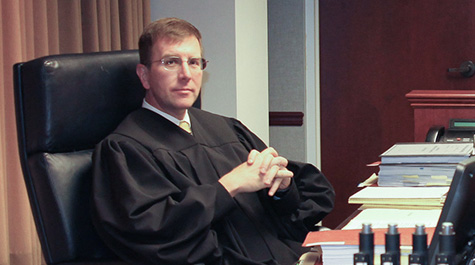Judge Pontzer, J.D. '89 Awarded Carnegie Medal for Saving Drowning Teen
Nowadays, the word “hero” is used to describe everything from movie characters to pop culture icons to favorite relatives. But every so often society learns of an act of true heroism when one risks his own life for another. It is this extraordinary heroism which showcases the best of humanity, and it is the sort of heroism recognized by the Carnegie Hero Fund Commission in awarding the Carnegie Medal.
Judge Peter F. Pontzer, a William & Mary Law School Class of 1989 graduate, was awarded the Carnegie Medal on December 20, 2016 for one such act of heroism. Pontzer was on vacation with his family in Emerald Isle, North Carolina, in July 2015 when a relative alerted him that someone was in trouble on the beach. A 13-year-old boy was being dragged by a current away from the shore and was crying for help. Pontzer, still healing from a sprained ankle, ran to the water after grabbing a rescue tube from the beach.
Once in the water, Pontzer was joined by Duncan O.C. Harris, a 21-year-old construction worker, as he swam 450 feet into the surf to find the boy floating on his back. Together, they pulled the boy against the current on the flotation device until they reached emergency medical personnel waiting on the shore. Had the boy spent a minute longer in the water, he likely would have drowned.
But Pontzer’s heroism did not end there. After reaching the shore, a youth leader told him that there was yet another child still caught in the surf. Pontzer dashed back into the water, breaking bones in his foot, to search for the other swimmer. Unfortunately, the rough water had already overcome the second boy, and Pontzer was forced to return to the beach where he collapsed. He was taken to the hospital by ambulance where he was treated for near-exhaustion and a stress fracture to his foot. The second boy’s body was recovered later by emergency personnel.
In addition to his heroism on the beach that day, Pontzer is an accomplished citizen. He is an Administrative Judge for the United States Postal Service Board of Contract Appeals from Fairfax, Virginia. After graduating from law school, he hiked the Appalachian Trail before joining the Army as a JAG officer serving in Panama, Honduras, El Salvador, and Virginia. While a JAG officer, he developed a specialty in government contracts, which he subsequently put to work for AT&T, the Federal Bureau of Prisons, the U.S. Department Housing and Urban Development, and then again with the Army as a civilian attorney before being appointed to his current role. Pontzer now hears contract disputes between the U.S. Postal Service and its contractors regarding trucking services, Post Office leases, construction issues, and disputes with rural mail delivery contractors.
Pontzer said he was almost embarrassed to admit, as a judge, that he spent almost no time evaluating the risks or analyzing the facts before he jumped into the water that day. “I just knew it was a bad situation and I needed to act,” he said.
This, however, is exactly the sort of selflessness the Carnegie Hero Fund Commission requires of its medal recipients. According to the Commission’s nominating guidelines, only “a civilian who voluntarily risks his or her own life, knowingly, to an extraordinary degree while saving or attempting to save the life of another person is eligible for recognition by the Carnegie Hero Fund Commission.” The act of heroism must also occur in the United States or Canada and be one in which no full measure of responsibility exists between the rescuer and the rescued.
These tight requirements mean that only about one in ten nominations for a Carnegie Medal is accepted, and approximately twenty percent are awarded posthumously. Pontzer’s actions were submitted to a thorough investigation after his nomination to secure conclusive evidence of each element of the requirements. “I was very impressed with the people at the Commission because they have been very professional and take their job seriously,” he said. “I have been through job interviews which have not been as detailed.”
Inspired by acts of heroism in a mine explosion, the Carnegie Hero Fund Commission was founded in 1904 by Andrew Carnegie to recognize ordinary citizens who perform extraordinary acts of heroism. Over a century later, ordinary citizens like Peter F. Pontzer are still performing extraordinary acts to save others. The opening lines of the fund’s Deed of Trust, written in 1904 by Carnegie himself, ring ever true today: “We live in a heroic age.”
About William & Mary Law School
Thomas Jefferson founded William & Mary Law School in 1779 to train leaders for the new nation. Now in its third century, America's oldest law school continues its historic mission of educating citizen lawyers who are prepared both to lead and to serve.
